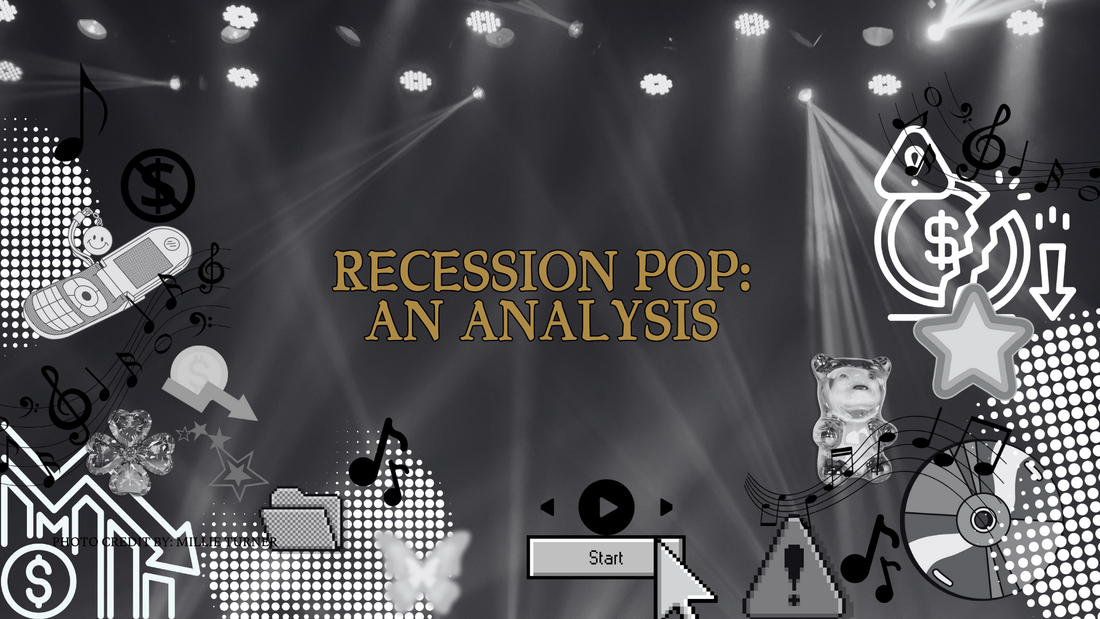
Recession Pop: An Analysis
Share
WRITTEN BY MILLIE TURNER
In 2008, the United States went through a recession caused by mortgages being handed by the banks to people who couldn’t afford them. This caused a rift in the economy so vast that highly educated people had to work lower wage jobs just to get by. The stock market crashed, businesses couldn’t get loans, and people lost their retirement savings.
An interesting effect the 2008 recession had was on our entertainment. Pop music that focused on escaping to the club and forgetting your troubles while lost in the glamor of nightlife became popular. For the sake of finding a personification of this concept, I shall deem Kesha the icon of recession pop. Her dance-club music represents the very idea and her recent comeback is a very telling resurrection.
I know that it’s very obvious to every American the social, political, and economic turmoil our country has been in since 2020. We are all feeling the strain and the shadow of fear that stalks behind us these past five years. And there is much merit to that fear: climate change, false online information, housing prices, lies from both sides of the aisle, low wages, social injustice, student loan debt, unstable leaders and watching loved ones argue over politics. Americans are lost, scared and feel deceived, no matter what party is on your voter’s registration card.
This is a very troubling time for the United States ecosystem. An ecosystem that feels like it will implode on itself at any moment. But as all failing ecosystems, a part of it will succeed as one part falters. Just as fungi thrives from a dead tree, the entertainment industry thrives from the struggles of American souls. Welcome back recession pop.
If Kesha, Pitbull and The Black Eyed Peas were some of the most popular examples of recession pop in the 2010s, who are the current representatives of that genre? As I stated earlier, Kesha has made a recent comeback so she would be one. Charli XCX and Chappel Roan are the others I would consider to be the recession pop artists of today. But what is recession pop? According to Wikipedia, “Recession pop is an informal term used to define a type of dance-pop music that emerged during the Great Recession and remained popular until the early 2010s.” Charli XCX’s album “brat” and Chappel Roan’s album “The Rise and Fall of a Midwest Princess” both have catchy, club tunes that showcase dance-pop as stated in the definition.
Charli XCX’s “Club classics” is a high energy song with fast beats and bares lyrics of dancing at the club to classic club songs. Whether she meant to or not, this song feels like the helm of the 2020s recession pop ship. The song could be interpreted as an homage to the “club classics” of the 2010s, a perhaps unintentional ironic shoutout to songs that we danced too during another historic time of economic uncertainty.
Chappell Roan’s “Hot To Go” and “Femininomenon” both took my breath away when I first listened to them. These tracks are absolutely euphoric with unique lyrics and endlessly fun feels. They make it impossible to think about anything other than Chappel Roan’s fabulously amusing world of girl-pop that makes you want to jump on stage and sing with her. How could you worry about rising temperatures, lying leaders and non-living wages when listening to any of these addictively catchy songs?
Kesha’s recent hits “Joyride” and “YIPPEE-KI-YAY” make you want to dance and scream the lyrics with your friends while you drive down the highway. As happy as I am to welcome back St. Kesha of Recession Pop, her presence is grim. She is the crow of the music industry, a symbol of destruction as we smile and dance to her music.
In contrast, the most popular songs in 2018 were “God’s Plan” by Drake and “rockstar” by Post Malone, which had slower, relaxing melodies. These songs were perfect for listening to while studying or taking a nice evening walk to calm down from your day. During that time, the economy was strong, unemployment was low and inflation was average. Additionally, the world was still innocent from the earth shattering results of the pandemic. The general public didn’t feel the need for distraction as we do now. With the resurgence of recession pop and nostalgia for the quirky pop culture of the 2000s, we want distraction as much as we did in the 2010s. It seems that the faster our music becomes, the faster we want to run away from our present realities.
Recession pop is back and as big as it was during the Great Recession. The reason for that is the everpresent horrifying news on your phone and the dipping stocks in your portfolio. The entertainment industry is taking advantage of people’s troubles and are making a profit from distracting you from them. Fortunately, we are all getting high quality dance music from it. It may seem lowbrow to try to understand the state of the world through your headphones, but one must understand that everything has an effect on everything else. Your school or work affects you at home just as the state of the workforce and economy affects the music you and your friends are currently talking about. If you are like me and are not highly knowledgeable when it comes to economics, I have one piece of advice for you if you want to know how America is doing. When you turn on the radio, do you want to sway, or dance?
